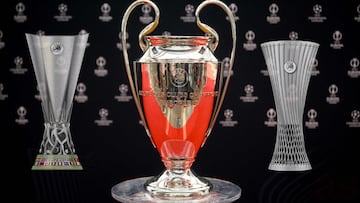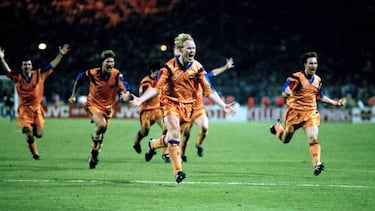Champions, Europa and Europa Conference Leagues compared
UEFA’s showpiece club competition captures the imagination of the world, but there so much more than the Champions League for European teams.

As we reflect on the changes to club football on the Old Continent, we realise that things have become a little more complicated. The European Cup, for example, initially a straightforward knockout tournament exclusive to league champions, maintained this structure even with the inception of the Champions League in the 1992-93 season. For the initial five seasons, only domestic champions were eligible to participate.
The UEFA Cup, on the other hand, served as a coveted reward for clubs that had performed admirably in the league but fell short of clinching the top spot. Interestingly, many observers contended that the UEFA Cup might have been, at times, the most formidable European cup competition, attributing this to the heightened participation of teams from major leagues.
Completing this trio was the now-defunct Cup Winners’ Cup, exclusively catering to domestic cup winners from the preceding season, adhering precisely to its descriptive name.

Now, however, things are rather less simple, which anyone who has ever watched a Champions/Europa/Europa Conference League draw will attest to.
How does the Champions League work?
The Champions League is, of course, no longer just for champions and hasn’t been for over 25 years. The current system means that qualification is heavily weighted in favour of clubs from the ‘big’ leagues/countries at the top of the UEFA coefficient, which ranks leagues in Europe from 1st to 55th.
The top four clubs* from the top four leagues qualify directly for the group stages, which is where the money is. The champions from just the top 10 leagues are guaranteed group stage football, although the qualifying stages are divided into the ‘champions’ path and the ‘league’ path (for clubs who finished second or third in their respective leagues).

For context, last season Newcastle United finished fourth in the Premier League, the top ranked domestic league, and qualified directly for the group stages. Meanwhile, Atlétic Inter d’Escaldes (Andorra), The New Saints (Wales), FK Budućnost (Montenegro), Lincoln Red Imps (Gibraltar) and Tre Penne (San Marino) were the champions of the leagues ranked 51st to 55th and entered the competition in the preliminary qualifying round. To reach the group stage, they would have to win five two-legged knockout ties... None of them made it to the big draw.
The runners-up from the top six leagues go straight into the group stage, while those from the 7th to 15th ranked leagues have a chance to qualify, as do the third-placed teams from the 7th, 8th and 9th best leagues.
After that, things get easier. Eight groups of four teams who play each other twice, with the top two teams in each group progressing to the knockout stages. All knockout ties are played over two legs, other than the final. Teams who finish third in the group drop down into the Europa League.
How does the Europa League work?
The UEFA Cup was rebranded as the Europa League for 2009-10 and now follows a relatively similar format to the Champions League, with qualification preceding a 32-team group stage, which is then followed by knockout rounds. However, there is an additional knock-out round after the group stage and before the last 16, in which the eight group runners-up face the eight teams who finished third in their Champions League groups for a place in the next round.

The current format is for clubs from leagues ranked 1st to 15th, with the exception of teams who lose during different stages of Champions League qualifying, who drop into different stages of Europa League qualifying. Following the discontinuation of the Cup Winners’ Cup, domestic cup winners now play in the Europa League, with the cup winners from leagues ranked 1st to 6th guaranteed places in the group stages, along with 5th-placed teams from the top four leagues, the 4th placed team from the 5th-ranked league and the winners of the previous season’s Europa Conference League (we’ll come to that in a moment).
Everyone else has to qualify although, unlike the Champions League, there are a maximum of two qualifying rounds.
How does the Europa Conference League work?
In terms of its format, the Europa Conference League is somewhere in the middle. Like the Champions League, there are multiple qualifying rounds (a maximum of four) and like the Europa League, there is a preliminary knockout round after the 32-team group stage. Unlike either of them, no team is guaranteed a place in the group stage. Everyone must qualify.
The Europa Conference League was created in 2021, theoretically as a European competition for teams from ‘weaker’ countries, yet teams from the ‘top’ leagues do still participate (e.g. the 6th-placed sides from the top four leagues (the EFL Cup winners in England’s case) go straight into the final qualifying round).
To put it simply, the higher the league is ranked, the later its participants start qualification. 20 teams eliminated from the early stages of Champions League qualifying will enter the second round of Europa Conference League qualifying, while teams eliminated from different stages of the Europa League also drop into the Europa Conference League at different moments.
Easy, right? Well, just as you’re thinking to yourselves, “thanks guys, I now understand it all,” get ready to update your knowledge as the format will change again for 2024/25.

What is the prize money for Champions League, Europa League and Europa Conference League?
Finally, a quick look at the difference in prize money between the different competitions. No wonder some clubs celebrate Champions League qualification more than winning an actual trophy.
| Champions League | Europa League | Europa Conference League | |
|---|---|---|---|
| Group stage | €15.64m ($17.17m) | €3.63m ($3.98m) | €2.94m ($3.23m) |
| Round of 16 | €9.6m ($10.54m) | €1.2m ($1.32m) | €600,000 ($658,,530) |
| Quarter-finals | €10.6m ($11.63m) | €1.8m ($1.98m) | €1m ($1.1m) |
| Semi-finals | €12.5m ($13.72m) | €2.8m ($3.07m) | €2m ($2.2m) |
| Final | €15.5m ($17.01m) | €4.6m ($5.05m) | €3m ($3.29m) |
| Winners | €20m ($21.95m) | €8.6m ($9.44m) | €5m ($5.49m) |
Related stories
And now you know...
*It’s worth noting that UEFA’s changes for the 2024/25 season means there will be four additional group stage spots allocated across nations. These will be distributed across three new slots and this includes the top two associations with the best club coefficient ranking securing a fifth-place team. At the time of writing, the top three leagues are Italy, Germany and England.
Complete your personal details to comment